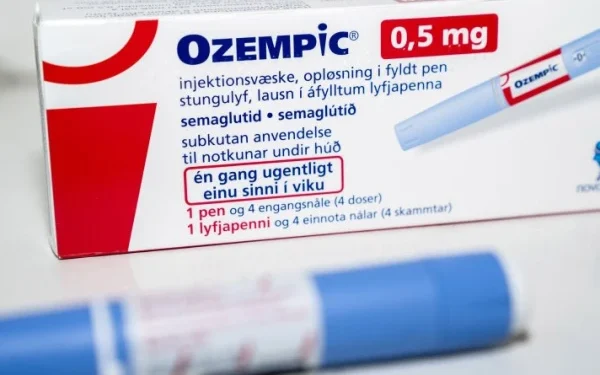In a significant development in the field of medical science, researchers have found that the widely known weight-loss drug Ozempic is also effective in treating fatty liver disease, formally known as non-alcoholic steatohepatitis (NASH) or steatohepatitis associated with metabolic dysfunction. The findings, published on April 30 in the New England Journal of Medicine, could potentially revolutionize the way clinicians treat patients with this silent yet deadly liver condition.
Ozempic’s Dual Role: Weight Loss and Liver Health
Originally developed as a treatment for type 2 diabetes, Ozempic (semaglutide) gained massive popularity for its weight loss benefits. Now, it appears that this glucagon-like peptide-1 (GLP-1) receptor agonist may also offer critical benefits for liver health. In a randomized, placebo-controlled clinical trial, researchers observed that 63% of patients who received Ozempic experienced reversal of fatty liver disease, compared to just 34% in the placebo group.
This represents a nearly two-fold increase in effectiveness, showcasing Ozempic as a promising treatment for a condition that has long lacked effective pharmaceutical interventions.
Understanding Fatty Liver Disease: A Growing Health Crisis
Fatty liver disease, or NASH, is characterized by the accumulation of excess fat in liver cells, which leads to inflammation, fibrosis (scarring), and in severe cases, cirrhosis or liver failure. Unlike liver disease caused by alcohol abuse, NASH is primarily linked to metabolic disorders, including:
- Obesity
- Type 2 diabetes
- High blood pressure
- Elevated cholesterol or triglyceride levels
According to the Cleveland Clinic, more than 15 million Americans are currently living with this condition, many of them undiagnosed. Due to its asymptomatic nature, the disease often progresses silently until it reaches a more dangerous stage.
The Clinical Trial: Promising Results
The trial, led by Dr. Arun Sanyal, Director of Virginia Commonwealth University’s Stravitz-Sanyal Institute for Liver Disease and Metabolic Health, enrolled hundreds of participants diagnosed with fatty liver disease. Participants were randomly assigned to receive either Ozempic or a placebo over a period of several months.
At the end of the trial:
- 63% of those taking Ozempic showed complete resolution of liver inflammation and no worsening of liver fibrosis.
- Only 34% of placebo recipients achieved similar results.
- Participants taking Ozempic also experienced significant weight loss, which is considered a major contributing factor to liver improvement.
“These results show that semaglutide not only treats the liver disease but also targets the underlying metabolic dysfunction that drives it,” said Dr. Sanyal.
The Science Behind Ozempic’s Effectiveness
Ozempic works by mimicking GLP-1, a naturally occurring hormone that helps regulate blood sugar levels, appetite, and insulin sensitivity. Its effectiveness in treating fatty liver disease is believed to be due to:
- Weight Reduction: Ozempic helps patients lose significant amounts of weight, which directly reduces fat deposits in the liver.
- Improved Insulin Sensitivity: By enhancing the body’s response to insulin, Ozempic reduces the risk of further fat accumulation in liver tissue.
- Anti-inflammatory Effects: Ozempic may reduce inflammation markers in the liver, helping to halt or reverse fibrosis.
No FDA Approval Yet — But Momentum Is Building
Despite its promising results, Ozempic is not yet FDA-approved specifically for the treatment of fatty liver disease. However, experts believe that this study, along with ongoing research, could pave the way for regulatory approval in the near future.
“Given the alarming rise in fatty liver cases globally, we urgently need pharmacological treatments,” said Dr. Sanyal. “These findings provide compelling evidence that Ozempic could become part of a multi-pronged approach to treat this disease.”
A Silent Epidemic on the Rise
Fatty liver disease is often referred to as a “silent epidemic” because it can go unnoticed for years. It is estimated that one in four adults worldwide suffers from some form of non-alcoholic fatty liver disease (NAFLD), the precursor to NASH. If left untreated, NASH can lead to serious complications, including:
- Liver cirrhosis
- Liver cancer
- Liver transplantation
- Increased cardiovascular risk
The rise in obesity and sedentary lifestyles has made NASH one of the fastest-growing causes of liver-related deaths globally.
The Role of Lifestyle Changes in Managing Fatty Liver Disease
While pharmaceutical solutions like Ozempic show promise, doctors emphasize that they should be used in conjunction with lifestyle changes, including:
- Weight loss through diet and exercise
- Avoiding sugary and fatty foods
- Reducing alcohol consumption
- Managing underlying conditions like diabetes and hypertension
These lifestyle changes are still considered the first line of defense against the progression of fatty liver disease.
Implications for Public Health
The potential for Ozempic to treat both obesity and liver disease could mark a turning point in public health strategies. By targeting multiple metabolic conditions simultaneously, drugs like Ozempic could reduce the long-term burden on healthcare systems and improve overall patient outcomes.
Dr. Sanyal and other experts are calling for larger, longer-term trials to validate these results and assess whether Ozempic can also prevent long-term complications such as cirrhosis or liver cancer.
Growing Demand and Market Expansion
The rising interest in Ozempic for non-diabetes-related uses is contributing to a surge in demand. In recent months, supply shortages have been reported globally due to its growing use in off-label treatments for obesity and, now potentially, liver disease.
Pharmaceutical companies and health authorities are closely monitoring these trends, and discussions are underway regarding guideline updates for treating metabolic liver diseases.
Conclusion: A Promising Future for Fatty Liver Disease Treatment
The discovery that Ozempic may not only aid in weight loss and blood sugar control but also reverse fatty liver disease represents a landmark in metabolic and hepatic medicine. With more than 15 million Americans potentially benefiting from this breakthrough, the clinical findings have opened new avenues of hope.
As research continues and awareness grows, the inclusion of Ozempic or similar GLP-1 agonists in the treatment plan for NASH may soon become standard practice — offering relief to millions suffering from this underdiagnosed condition.

























